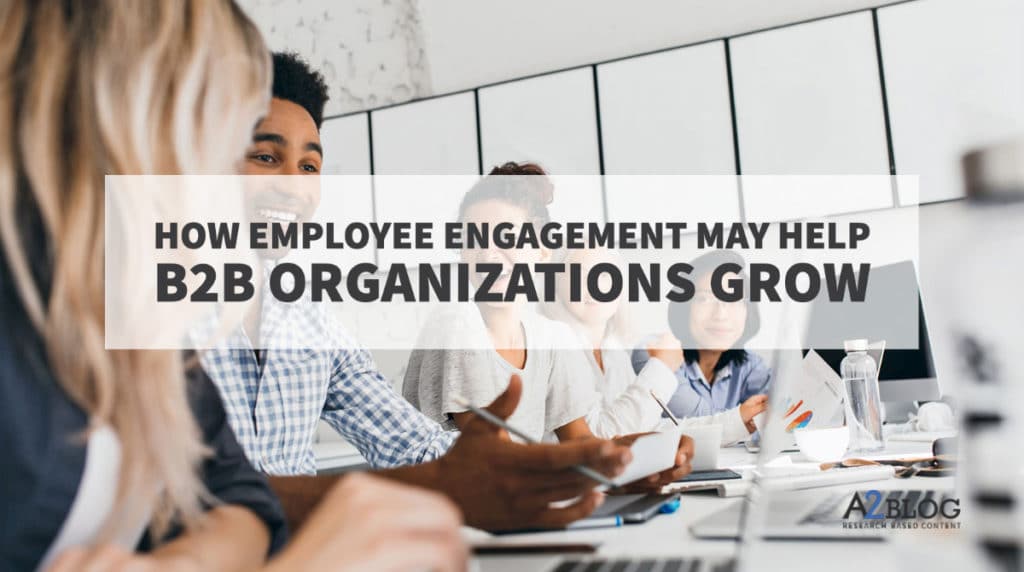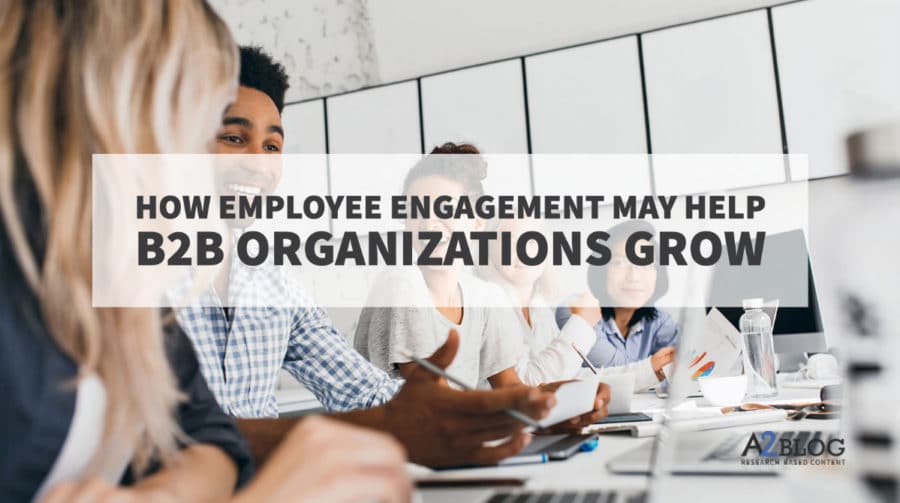Guest post provided by: Anjan Pathak, Co-founder & CTO of Vantage Circle

Many factors contribute to B2B organizations’ growth. But one of the key drivers for the growth of B2B organizations is employee engagement.
Employees are arguably the most important assets of an organization. They deal with clients, build the workplace culture, and drive performance.
And when they are truly invested in their work, they help grow the overall business. So it’s very important that they remain engaged at work.
You can imagine how employees touch on every part of the criticall business growth drivers at your company, including:
- Generating quality leads,
- Having a strong understanding of customer needs,
- Nurturing existing customers,
- Fostering a culture of innovation, and
- Providing good value for money and customer service.
We’ll see how employee engagement is the most important factor in driving B2B growth.
Let’s begin with the specifics of employee engagement.
What is employee engagement?
Employee engagement is an employee’s dedication and passion for their work and the company. It reflects the emotional commitment to work and how well they identify with the company culture.
When workers are truly engaged, they perform better. They are proactive and tend to go above and beyond what is expected. Naturally, they contribute more towards business growth.
To get an idea of the impact of employee engagement, let’s look at some statistics from Gallup.
- Highly engaged teams show 21% greater profitability.
- Engaged employees are 17% more productive than disengaged ones.
- Companies with engaged employees produce 26% higher revenue.
- Highly engaged workplaces saw 41% lower absenteeism.
- Engaged employees increase customer ratings by 10%.
The numbers are clear.
High employee engagement equals better business.
What are the benefits of employee engagement for B2B organizations?
Let’s look at a few reasons why employee engagement is viewed as a critical factor in B2B organization growth:
Increase customer satisfaction
One of the critical aspects for B2B organizations to grow is to build healthy relationships with their customers. They must invest in client nurturing and prioritizing the customer experience.
For this, employees must have a human approach while interacting with prospects. It won’t do if your employees are not motivated to give their best. Even in B2B we know how important feedback, reviews and ratings are.
Employees must build meaningful connections. This is possible only if employees are enthusiastic about providing a great experience to their customers.
Companies must focus on the employee experience to improve their customer experience. It’ll start reflecting on your bottom line if you don’t appreciate your employees or do enough to keep them engaged.
Better corporate culture
If employees are not satisfied with their jobs, it becomes challenging for companies to maintain a positive work culture. So it becomes necessary for them to invest in employee engagement strategies.
Engaged employees believe in the company’s mission and are fully invested in their work. They engage in active communication, help their colleagues, and support teamwork.
They’ll put in discretionary efforts to produce extraordinary results. This helps strengthen the company’s culture and overall business culture.
Boosts brand advocacy
Engaged employees help sell the business, which also goes for B2B businesses.
When employees feel happy at work, they share their positive employee experiences. They promote their companies and become active ambassadors for the organization. Such interactive stories can create emotional connect with viewers and inspire people to trust the brand.
Just like thought leadership boosts brand awareness and expert status, positive employer branding is critical for businesses in today’s hyper-competitive and fast-paced world.
So companies must adjust their brand strategies to incorporate employee engagement into their communication.Each and every employee can become a brand advocate!
Increases productivity
Employee engagement is not just linked to employee happiness and satisfaction. It also has deep implications for productivity.
When employees are truly engaged, they understand their contribution to the organization. They enjoy their work and value the time they spend at the workplace. They want to use their skills and prove their leadership capabilities. They’ll develop new ideas and go above and beyond to solve challenges.
Interestingly, this is how an agile work environment functions. By increasing employee engagement, an agile work framework can bring about phenomenal changes. Like reduced costs of tools, improved collaboration, boost in employee retention and experience. It also paves the way for easy accommodation of contract workers, consultants, and additional staff.
B2B organizations that want to grow must develop a work culture that allows employees to excel. This will increase productivity and propel the company forward.
Higher chances of employee retention
Employees who feel connected to their work are less likely to leave their jobs. This is important during the current times of the Great resignation. Employee retention is also tied to minimizing frequent recruiting and saving time and money.
Another related benefit of employee engagement is that businesses can keep top-performing employees.
There’s a rising issue of employees joining competitors, which also risks losing customers. Companies nowadays are engaged in a competitive war for talent. Employees, too, have a lot of options in the market.
So leveraging employee engagement strategies can keep high-performers engaged and help in retention.
Increased Profitability
Another logical benefit of employee engagement is increased profitability. If your employees are motivated enough to give their best to get the best results, you’ll see a substantial rise in profits.
What can B2B companies do to boost employee engagement?
Now that we know why employee engagement is important, the next best thing would be to leverage it to grow your business.
So how to do that?
There are many employee engagement strategies to choose from, and here we outline some of the best ones.
Gather employee feedback
Before applying employee engagement strategies in your workplace, you need to know where you stand.
You need to collect data to understand and analyze which policies are doing well, where you need to improve, and have a benchmark for the future.
Here is where measuring employee engagement comes into play.
Measuring employee engagement is primarily about taking feedback, and employee newsletters and surveys are the most efficient (but certainly not the only) ways to do that.
Make sure to take the feedback seriously and work on improving the areas of concern. If you don’t, you’ll give the impression that you are taking your employees for granted, which will be counterproductive to your goals.
Be clear in communication
Communication is key to increased engagement. Companies with strong communication practices perform better. It helps employees open up, discuss ideas or issues they face, and build trust. It isn’t an accident that “Earn trust” is one of Amazon’s 16 Leadership Principles and clear communication builds trust.
On the other hand, lack of communication leads to misunderstandings and pushing of deadlines.
As a B2B company grows and it onboards more employees, keeping everyone in the loop can be difficult. Also, remote work has been forcing the workforce to work in isolation.
To ensure engagement, you must regularly communicate with your employees. Let them know their tasks, ask about their issues, and take their input. Take the help of digital tools to make communication easy between employees, teams, and departments.
Clarify company goals and objectives
Suppose employees don’t understand what the organization wants to achieve. In that case, you can’t expect them to be completely engaged in their work.
With a deeper understanding of company goals and objectives, they’ll feel closer to their peers and the brand. This will also reflect in the work that they do.
Start by assessing your brand values and get your senior management involved in the process. Ensure your company values are clear and visible and communicate them to all your employees regularly.
Recognize and reward employees
One of the main reasons why employees are disengaged is because they often feel unappreciated. And as your company grows, the feeling of alienation only increases. So it’s pertinent that employees are regularly and continuously recognized for their efforts.
Everyone likes to be acknowledged for the work they do. It lets them know that someone notices and values them. These gestures can greatly boost employee motivation, morale, and a sense of belonging.
Make recognition a natural part of the company culture. If an employee does well, be sure to publicly acknowledge this. Introduce rewards and incentives to encourage others to put their best foot forward.
Involve employees in meaningful tasks
Another way to improve employee engagement is by encouraging autonomy at work and empowering them.Trusting them to make important decisions is one of the most effective ways to get them to try harder and commit to your organization.
This is one of the things that Jan Carlzon, former CEO of Scandinavian Airlines introduced when he talks about Moments of Truth. They went through several customer service improvements to allow customer service employees to make their own decisions both improving the customer experience and employee satisfaction.
Assign employees with meaningful and important work. Try to involve them in the decision-making processes. They’ll feel valued and thus work harder for the company’s growth.
Invest in employee well-being
If you truly want to boost employee engagement, you must focus on employee well-being.
Employee well-being is an increasingly crucial issue, and focusing on it can boost employee engagement.
Companies must look after their employees, ensure they are healthy, and provide them with a better work-life balance.
This will not just result in happier employees but also boost retention rates.
Start with asking the right questions. Are they getting proper sleep? Are they drained out? Actively listen to them and provide them professional support.
With remote work, ensuring employee well-being has become more challenging. Here, digital wellness programs can be a great method to drive a healthier lifestyle.
Conclusion
Employee involvement is important to a company’s success. And true employee engagement is all about how you treat and interact with your employees.
Businesses must use appropriate engagement strategies to provide employees with the best experience. This requires a multi-dimensional approach fueled by continuous improvement.
Author Bio
Anjan Pathak is the Co-founder & CTO of Vantage Circle, a cloud-based employee engagement platform and Vantage Fit – Corporate Wellness Platform. He is an HR technology enthusiast, very passionate about employee wellness, and actively participates in corporate culture growth. He is an avid reader and likes to be updated on the latest know-how of Human Resources.

